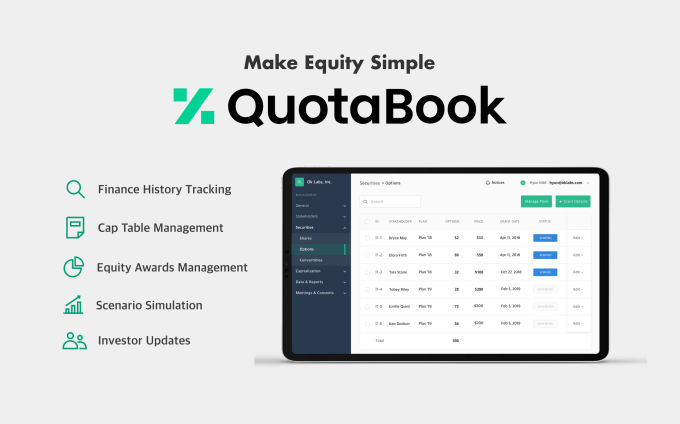QuotaBook, a Seoul-based equity management platform, has raised $11 million in funding led by Elefund, with participation from Access Ventures, Hana Securities and South Korean fintech company Viva Republica. Some of its previous backers, including Draper Associates and Capstone Partners, joined the round.
The Korean startup, which graduated from Y Combinator (YC)’s Winter 21 batch, was founded by former venture capitalists Andy Choi, Dan Hong and Pilseon Jun, in 2019. Choi, the company’s CEO, said in an interview with TechCrunch that in their capacity as investors, the three noticed that in Korea and many other Asian countries, startups were still relying on Excel when managing their cap tables, stock options, stakeholder and other related information.
That meant the startups’ backers were forced to make sense of these spreadsheets, too. “VCs were stuck with Excel sheets or very old enterprise resource planning (ERP) tools, so old that they are not web-based and can be installed only on Windows machines,” Choi said. “It created a very annoying and error-prone process where startups and investors were regularly exchanging crucial equity data and corporate info via document attachments or text messages.”
Everyone was typing in the data manually because investors and startups had different formats and had to run double checks from each side again, Choi told TechCrunch.
“I had a case where the startup didn’t provide their most up-to-date cap table Excel sheet for more than two months, which made it hard for us to update our investment valuations and returns that were needed to be reported to our LPs,” Choi said.
QuotaBook will use the latest funding — which brings its total raised to approximately $20 million — to digitize the equity/fund management process, providing a common standard for security-related data, and making it possible to safely host shareholder and board meetings online. Additionally, the startup plans to scale out its product team, enter Southeast Asia and launch its service for investors in the Middle East, Choi noted. “The [Asian] market is still very young, so we also want to set up local offices or teams in the regions like Vietnam, Indonesia, Singapore and Taiwan.”
Currently, the outfit employs 45 people, Choi added.

Image Credits: QuotaBook
QuotaBook claims that it has more than 3,500 startups and investor users on its platform, largely based in South Korea, where the company started. About 40% of startups in Korea use QuotaBook’s service that provides cap table management, according to Choi. In June, it launched a restricted stock units (RSU) management service.
Its SaaS-based platform offers two services: an equity management service for startups, which includes cap table management, stock option management, investor reporting, investor consents, shareholder and board meetings, and a fund management platform for investors, which provides fund info, investment and returns management, portfolio management, LP commitment and returns management, LP reporting and fund activity analytics.
Its startup users start with a freemium plan. If they upgrade to a plan with more features, they get charged by the number of stakeholders, like holders of securities and stock options, Choi said. Investors also get charged based on the AUM of their funds and the number of portfolios.
QuotaBook also recently launched a communication platform called QuotaSpace that focuses on the communication and networking between investors and their portfolio companies. Choi said more features are coming, too.
“Once our core business settles down, we plan to expand into new business opportunities with the network and data we cover. Helping out with secondary sales and providing data services are a few examples,” he said.
QuotaBook did not provide its valuation when asked. The startup raised its previous funding in June 2021 from Draper Associates, Carta Ventures, Elefund, Goodwater Capital and Scale Asia Ventures.
Powered by WPeMatico






